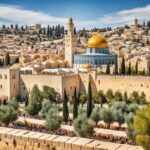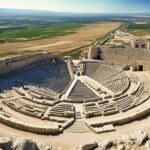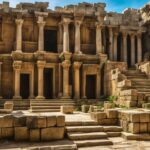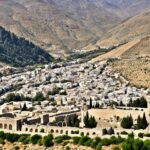The city of Jezreel holds great significance in biblical history. Located in the beautiful Valley of Esdraelon or the Great Plain, Jezreel witnessed numerous events chronicled in the Old Testament. Its name, meaning “God will sow,” reflects the agricultural abundance of the region and the spiritual implications associated with the city.
Jezreel’s biblical account is filled with stories of triumph and tragedy. It was the stage for the death of King Ahab’s notorious wife Jezebel and the murder of Naboth. Battles between competing kingdoms were fought in this consequential valley, shaping the historical narrative of ancient Israel.
Key Takeaways:
- Jezreel’s biblical meaning is rooted in its name, “God will sow,” signifying spiritual significance.
- The city’s violent history, including the deaths of Jezebel and Naboth, is a testament to its biblical account.
- Jezreel played a pivotal role in the Old Testament, witnessing battles and the rise and fall of kings.
- The Valley of Jezreel holds eschatological speculative importance as a potential location for the battle of Armageddon.
- Exploring Jezreel’s biblical history provides insights into the workings of God in human affairs.
Historical Significance of Jezreel
Jezreel, a city of great historical significance, played a crucial role in ancient times and biblical history. As the capital of the northern kingdom of Israel under King Ahab, Jezreel witnessed key events that shaped the course of the nation and impacted the Old Testament narratives.
One notable event was the death of King Saul, the first king of Israel, which occurred in the battle against the Philistines near Mount Gilboa. Additionally, Jezreel served as the stage for the rise of King Jehu, who led a revolt against the house of Ahab, purging the kingdom of idolatry and executing Jezebel, the infamous wife of King Ahab.
The city’s historical significance is further highlighted by the murder of Naboth, a story illustrating the consequences of covetousness and abuse of power. Jezreel also witnessed the downfall of King Josiah, who met his tragic fate in battle.
“Jezreel, the city of great historical significance, bears witness to the rise and fall of kings, the triumphs, and tragedies that unfolded within its walls.”
The biblical accounts of Jezreel reveal its integral role in the Old Testament as a backdrop to political, social, and spiritual realities. Through these historical events and the moral lessons they teach, Jezreel offers valuable insights into the workings of divine justice, the consequences of disobedience, and the faithfulness of God throughout history.
Key Historical Events in Jezreel
- Death of King Saul
- Rise of King Jehu and the purging of idolatry
- Murder of Naboth
- Defeat of King Josiah
| Event | Description |
|---|---|
| Death of King Saul | The first king of Israel died in battle against the Philistines near Mount Gilboa. |
| Rise of King Jehu | Jehu led a revolt against the house of Ahab, purging the kingdom of idolatry and executing Jezebel. |
| Murder of Naboth | Ahab and Jezebel schemed to acquire Naboth’s vineyard and subsequently orchestrated his unjust execution. |
| Defeat of King Josiah | Kings Pharaoh Neco of Egypt and King Josiah engaged in battle, resulting in Josiah’s untimely death. |
Geographical Location of Jezreel
Jezreel is nestled in the picturesque Valley of Esdraelon, also known as the Valley of Jezreel. This expansive valley stretches all the way from the majestic Mount Carmel to the mighty Jordan River, displaying breathtaking natural beauty along its path. Situated between the Gilboa, Little Hermon, and Tabor mountains, Jezreel finds itself in the heart of the Jezreel Valley, a region renowned for its historical and biblical significance.
One notable feature of Jezreel’s location is its close proximity to the city of Nazareth, hallowed ground in Christian tradition as the birthplace of Jesus. This adds an extra layer of cultural and religious significance to the area, attracting pilgrims and tourists from all around the world.
“The Valley of Jezreel is a harmonious blend of natural splendor and rich history, making it a captivating destination for both nature enthusiasts and history buffs alike.”
| Location | Valley of Esdraelon (Jezreel Valley) |
|---|---|
| Mountain Range | Gilboa, Little Hermon, Tabor |
| Adjacent City | Nazareth |
Archaeological Discoveries in Jezreel
Excavations in Jezreel have yielded remarkable archaeological findings, shedding light on the ancient history and cultural practices of the region. A standout discovery includes the unearthing of a distinctive type of pottery known as Esdraelon ware, characterized by its gray-burnished appearance. These artifacts provide valuable insights into the material culture and daily life of the ancient inhabitants of Jezreel.
The collection of ancient artifacts found during the Jezreel excavation showcases the vibrant past of the region. Among the findings are intricate pottery vessels, including bowls, jugs, and storage jars, adorned with ornate designs and patterns that reflect the artistic skills of the craftsmen of that era. These artifacts offer a glimpse into the sophisticated craftsmanship and aesthetic taste of the ancient Jezreelites.
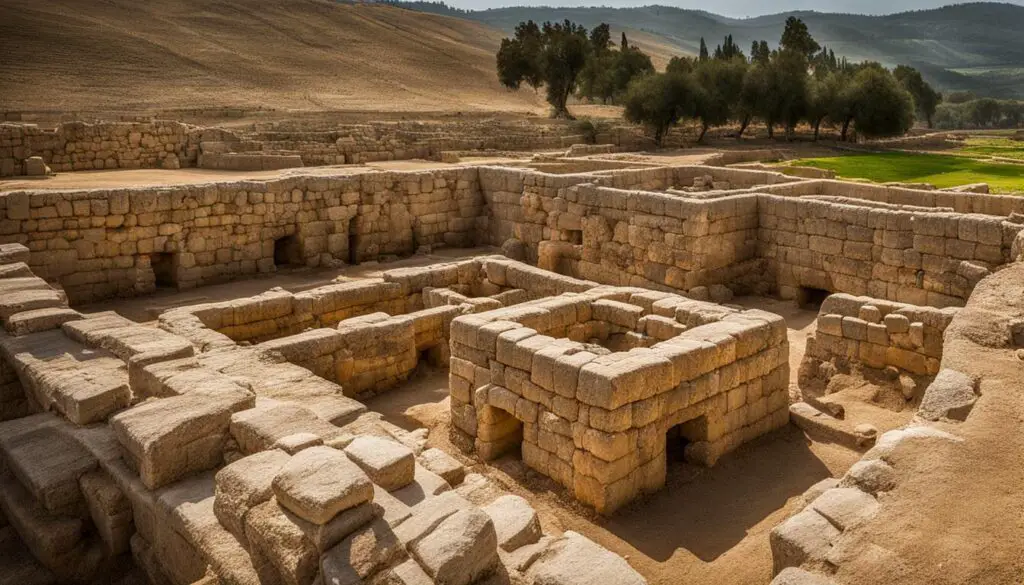
Further excavations have revealed remnants of structures and buildings, providing clues about the architecture and urban development of Jezreel in antiquity. The structural remains, including walls, foundations, and courtyards, offer valuable insights into the layout and construction techniques of ancient Jezreel.
“The excavations in Jezreel have yielded an array of artifacts that allow us to envision the daily life and cultural practices of the ancient inhabitants. These findings contribute significantly to our understanding of the region’s history and its connections to neighboring civilizations.”
Highlights of Archaeological Discoveries
| Artifact | Description |
|---|---|
| Esdraelon Ware Pottery | A distinctive type of gray-burnished pottery with intricate designs, providing insights into ancient Jezreelite aesthetics. |
| Pottery Vessels | Intricately crafted bowls, jugs, and storage jars, revealing the skill and artistry of ancient Jezreelite potters. |
| Structural Remains | Unearthed foundations, walls, and courtyards that offer valuable information on the architecture and layout of ancient Jezreel. |
The archaeological treasures unearthed in Jezreel enable historians, archaeologists, and enthusiasts to piece together the puzzle of the city’s past. These findings contribute not only to academic research but also to our collective understanding of the rich and diverse history of this ancient biblical city.
Theological Themes in Jezreel
Jezreel, with its historical and cultural significance, holds a profound theological meaning in biblical texts. This ancient city represents various themes that play a vital role in religious understanding and moral lessons. Let us explore the theological significance of Jezreel in biblical theology and delve into the religious symbolism it conveys.
Divine Judgment: Jezreel serves as a backdrop for divine judgment in the Bible. Throughout biblical accounts, the city witnesses the consequences of disobedience and the righteous judgment of God. It portrays moments where individuals face the repercussions of their actions, emphasizing the importance of faithfulness and obedience.
Faithfulness and Consequences: The stories associated with Jezreel highlight the significance of faithfulness to God and the inevitable consequences that follow disobedience. The city showcases the repercussions of unfaithfulness and the rewards of remaining steadfast in one’s faith and devotion to God.
Working of God in Human Affairs: Jezreel’s significance extends beyond its historical context. It beautifully exemplifies the working of God in human affairs, illustrating how He interacts with individuals and nations, shaping their destinies and unfolding His plans.
“Jezreel’s stories in the Bible provide valuable insights into the theological themes of divine judgment, faithfulness, and the consequences of disobedience. Its significance as a symbolic place in biblical theology continues to resonate with believers, reminding them of the importance of living a faithful and obedient life.”
The Religious Symbolism of Jezreel
Jezreel’s biblical narrative goes beyond its historical and theological significance, as it also carries rich religious symbolism. The city’s name, meaning “God will sow,” embodies the act of divine planting and sowing seeds of faith in the hearts of individuals. It symbolizes the potential for spiritual growth and the cultivation of righteousness.
The Jezreel Valley, with its lush landscapes and fertile lands, represents an abundant harvest that is the result of a faithful and obedient life. It metaphorically illustrates the spiritual blessings that await those who remain steadfast in their faith and heed God’s commandments.
The religious symbolism of Jezreel serves as a reminder of the divine provisions available to those who walk in righteousness, while also warning against the consequences of straying from the path of faithfulness.
| Symbolism | Meaning |
|---|---|
| Sowing Seeds | Divine planting and growth of faith |
| The Jezreel Valley | Abundant spiritual blessings through obedience |
Key Biblical Events in Jezreel
Jezreel, a significant location in the Old Testament, witnessed several pivotal biblical events that shaped the course of history and highlighted the struggles of righteous individuals against corruption and evil.
Death of King Saul
In the Valley of Jezreel, the tragic demise of King Saul took place, marking a turning point in Israel’s monarchy. Saul, the first king of Israel, fell in battle against the Philistines, leading to the rise of King David as his successor.
Murder of Naboth
The story of Naboth’s vineyard, set in Jezreel, showcases the abuse of power and the consequences of greed. King Ahab desired Naboth’s vineyard but was refused. This rejection led Queen Jezebel to orchestrate the false accusation and subsequent execution of Naboth, fulfilling Elijah’s prophecy of divine judgment.
Defeat of King Josiah
Jezreel proved to be an unfortunate battleground for King Josiah of Judah. In his quest to oppose the advancing Egyptian army, Josiah was mortally wounded in the Valley of Megiddo, near Jezreel. This event marked the end of Josiah’s righteous reign and brought about a period of darkness for the kingdom.
Battles and Victories
Jezreel was also the site of several battles fought by notable biblical figures. Deborah and Barak, under God’s guidance, triumphed over the Canaanite army led by Sisera in the Valley of Jezreel. The victory celebrated the faith and bravery of Deborah, a prophetess and judge, and highlighted God’s deliverance of His people from oppression.
Additionally, Gideon, known for his fleece test and his leadership during the period of the Judges, pursued the Midianite army, eventually defeating them in the vicinity of Jezreel.
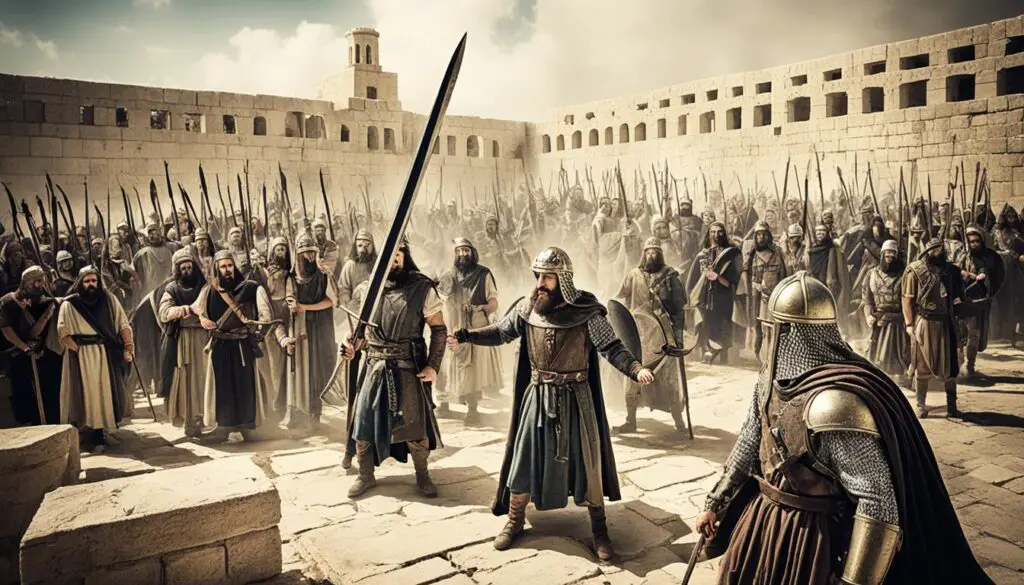
Cultural and Religious Practices in Jezreel
Jezreel, situated in the ancient Valley of Esdraelon, was a vibrant center of cultural and religious practices. As the city interacted with various civilizations, including the Israelites, its traditions and customs evolved and influenced the worship practices of the region.
Under the reign of King Ahab and his wife Jezebel, Jezreel experienced a deviation from the monotheistic worship of the Israelites. The city became entangled in the worship of false gods, which had a significant impact on the religious landscape of the region.
“The influence of Jezreel’s cultural and religious practices extended beyond its borders, leaving a lasting imprint on the religious traditions of the time.”
Archaeological findings in Jezreel have provided valuable insights into the religious practices and rituals of the ancient city. These discoveries include artifacts used in various religious ceremonies, offering a glimpse into the rich cultural tapestry of Jezreel’s past.
Religious Practices in Jezreel
| Religious Practice | Description |
|---|---|
| Offerings and Sacrifices | Jezreelites practiced offering sacrifices to their deities, often involving animals and agricultural produce. |
| Idol Worship | The worship of false gods, including Baal and Asherah, played a significant role in Jezreel’s religious practices. Temples and shrines dedicated to these deities were established throughout the city. |
| Divination | Divination was a common practice in Jezreel, with the inhabitants seeking guidance and insight into the future through methods such as casting lots, interpreting dreams, and consulting oracles. |
| Pilgrimages | Jezreel served as a destination for religious pilgrimages, drawing worshippers from neighboring regions who sought blessings or participated in festive celebrations. |
The cultural and religious practices in Jezreel symbolize the complexities of religious expression and the diverse influences that shaped the city’s identity. These practices continue to intrigue scholars and provide valuable historical context for understanding the religious landscape of the ancient world.
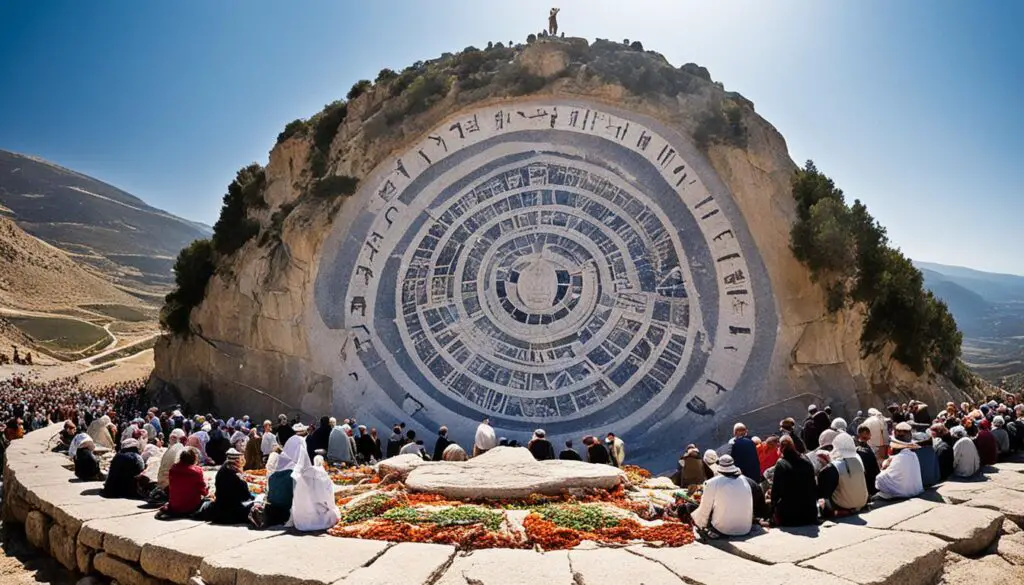
Prophetic and Eschatological Significance of Jezreel
Jezreel, a location of historical and biblical importance, holds a unique place in prophetic and eschatological discussions. It is believed by some that future events, including the battle of Armageddon, will unfold in the Valley of Jezreel.” The Jezreel prophecy, mentioned in the book of Hosea, speaks of a time of judgment and restoration. This prophecy has garnered attention and speculation among theologians and scholars.
“And it shall come to pass, in that day, that I will break the bow of Israel in the valley of Jezreel.” – Hosea 1:5
This verse, often interpreted as a symbolic representation of divine judgment and consequences, has led to varying interpretations regarding the role of Jezreel in future events. The eschatological significance of Jezreel continues to captivate the minds of those who study biblical prophecies and the end times.
Some anticipate that Jezreel’s historical backdrop, coupled with its prophetic connections, will play a significant role in future events predicted in scripture. The Valley of Jezreel, with its unique geographical position and rich biblical heritage, holds a fascination for those seeking to understand the unfolding of God’s plan.
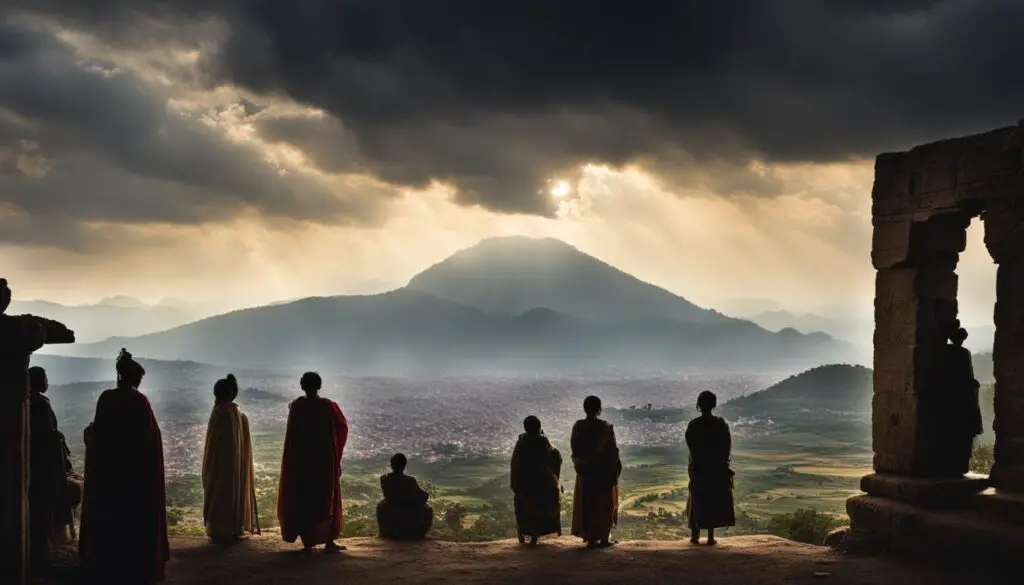
The future events that may transpire in Jezreel remain a subject of theological exploration and debate. While interpretations of biblical prophecies vary, the enduring significance of Jezreel in eschatology continues to inspire further inquiry and reflection.
Modern Significance and Preservation Efforts
The Jezreel Valley, located in present-day Israel, holds not only historical and archaeological value but also plays a significant role in modern society. Today, the valley thrives as a prosperous farmland, renowned for its cultivation of crops such as wheat, cotton, corn, and sunflowers.
However, alongside the agricultural prosperity, efforts are being made to preserve the historical and cultural significance of Jezreel, ensuring that its rich biblical history is not forgotten. The preservation initiatives aim to attract both tourists and scholars interested in exploring the ancient heritage of this region.
Preserving the heritage of Jezreel offers visitors the opportunity to immerse themselves in the biblical narratives that unfolded in this historic setting. Tourists can walk in the footsteps of biblical figures, gaining a deeper understanding of the events and teachings that shaped ancient civilizations. The preservation efforts also provide scholars with valuable resources for further research and exploration.
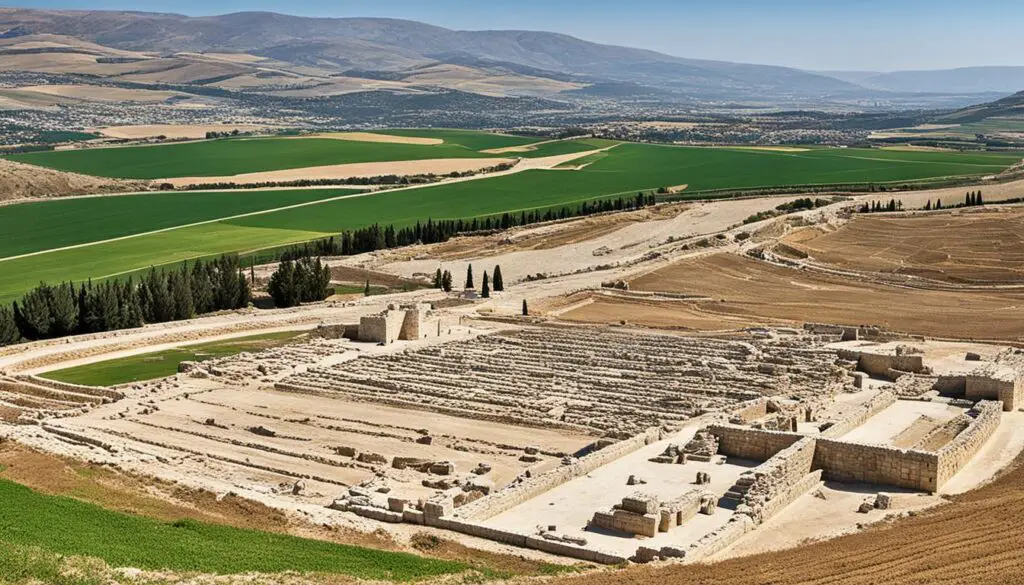
One of the key initiatives in preserving Jezreel’s heritage is the careful management and protection of archaeological sites. These sites serve as windows into the past, revealing artifacts and remains that shed light on the lives and cultures of ancient civilizations. By studying and conserving these archaeological treasures, scholars can piece together a more comprehensive understanding of the history and significance of Jezreel.
Furthermore, guided tours and educational programs have been developed to promote Jezreel as a tourist destination. These tours offer visitors the opportunity to explore the ancient ruins and landmarks within the valley, guided by knowledgeable experts who provide insights into the historical context and spiritual significance of the region. The tours provide a unique and immersive experience, allowing visitors to connect with the biblical stories that unfolded in Jezreel.
The preservation efforts extend beyond physical sites and tours. Academic institutions and research centers work tirelessly to document and analyze the historical and cultural aspects of Jezreel. Through research and publications, they contribute to the collective knowledge surrounding Jezreel, ensuring that its significance endures for future generations.
Promoting Cultural Exchange and Understanding
Preserving Jezreel’s heritage not only benefits those interested in biblical history but also fosters cultural exchange and understanding. By showcasing the rich tapestry of ancient cultures and civilizations that thrived in Jezreel, visitors from all backgrounds gain insights into the diverse past of this region.
“Jezreel’s preservation efforts not only safeguard history but also inspire curiosity and promote intercultural dialogue. Through the preservation and exploration of Jezreel, we gain a deeper appreciation for the shared heritage of humanity.”
By attracting tourists and scholars from around the world, Jezreel serves as a bridge that connects people across borders, fostering a sense of commonality and appreciation for the mosaic of human history.
| Benefits of Preserving Jezreel | Efforts to Promote Preservation |
|---|---|
|
|
Through these preservation efforts, Jezreel continues to serve as a thriving farmland while simultaneously preserving its historical and spiritual significance. It remains a testament to the enduring legacy of humanity’s past and a remarkable destination for those seeking to connect with biblical history and ancient cultures.
Impact of Jezreel on Christian Scriptures
Jezreel’s influence extends beyond the Old Testament and is also referenced in Christian texts, particularly in the New Testament. The historical and theological context of Jezreel plays a significant role in shaping the understanding of biblical narratives and the teachings of Christianity.
The Significance of Jezreel in New Testament
In the New Testament, Jezreel is mentioned as a reference to the ancient city and its historical significance. The city’s turbulent history, including events such as the death of King Ahab and the murder of Naboth, serves as a backdrop to highlight moral lessons and consequences of disobedience.
“For the blood of Naboth and the blood of his sons that I saw yesterday, says the Lord, shall surely come upon the head of Jehu in the territory of Jezreel.” – 2 Kings 9:26
These biblical references not only provide historical context but also emphasize the importance of righteousness and accountability in the Christian faith.
Jezreel’s Influence on Christianity
The stories and teachings associated with Jezreel have had a lasting impact on Christianity. Lessons derived from Jezreel’s theological themes, such as divine judgment, faithfulness, and the consequences of disobedience, continue to shape Christian beliefs and practices.
The city’s historical significance, as depicted in the Bible, serves as a reminder of God’s sovereign control over human affairs and the importance of obedience to His commandments.
Jezreel in Christian texts
Jezreel’s presence in Christian texts underscores the interconnectedness of the Old and New Testaments and lends depth to the biblical narrative. Its inclusion highlights the continuity of God’s redemptive plan throughout history, emphasizing the importance of understanding and studying the entire biblical canon for a comprehensive understanding of Christian teachings.
| Key Points | Implications |
|---|---|
| Jezreel’s historical and theological significance | Provides depth and context to biblical narratives and Christian teachings |
| References to Jezreel in the New Testament | Highlights the enduring relevance of Jezreel’s lessons in the Christian faith |
| Influence of Jezreel on Christianity | Shapes beliefs, practices, and moral values within the Christian community |
Exploring Jezreel’s Legacy
Jezreel’s historical and religious importance has left a lasting impact on believers and scholars alike. The stories and teachings associated with Jezreel continue to resonate, offering valuable insights into biblical themes, cultural practices, and the ways in which God has worked throughout history.
The legacy of Jezreel stretches beyond its physical location, capturing the imagination and curiosity of those seeking to understand the depth of its historical importance. From ancient biblical accounts to present-day interpretations, Jezreel remains a symbol of faith, resilience, and divine intervention.
The tales of Jezreel’s past, filled with triumphs and tragedies, serve as a reminder of the complexities of human nature and the consequences of our actions. As believers delve into the biblical accounts set in Jezreel, they gain a deeper understanding of the moral lessons and spiritual truths embedded within these narratives.
“Jezreel’s legacy is a tapestry woven with stories of courage, sacrifice, and redemption, leaving an indelible mark on both religious and secular history.”
Furthermore, Jezreel’s enduring impact extends beyond the pages of scripture. Its influence can be seen in religious rituals, cultural practices, and even modern-day literature and art. The city’s historical significance serves as a bridge between the ancient world and contemporary times, connecting believers to the foundations of their faith and offering a glimpse into the rich tapestry of human existence.
As we explore Jezreel’s legacy, it becomes clear that the historical importance of this ancient city cannot be understated. It stands as a testament to the power of faith, the complexities of human civilization, and the lasting impact of Jezreel’s stories on religious and cultural traditions.
Exploring Jezreel’s Legacy – Key Points:
- Jezreel’s stories and teachings provide valuable insights into biblical themes, cultural practices, and divine intervention.
- It serves as a symbol of faith, resilience, and the consequences of human actions.
- Jezreel’s legacy offers moral lessons and spiritual truths that continue to resonate with believers.
- The historical importance of Jezreel extends beyond religious scripture, influencing various aspects of human civilization.
- It acts as a bridge between the ancient and modern worlds, connecting believers to their faith’s foundations.
In conclusion, Jezreel’s lasting impact and historical importance are evident in the rich tapestry of its legacy. Through its narratives, we discover timeless truths and gain a deeper understanding of our own place in the grand narrative of human history.
| Legacy of Jezreel | Lasting Impact | Historical Importance |
|---|---|---|
| Faith | Resilience | Biblical Themes |
| Spiritual Insights | Cultural Traditions | Human Civilization |
| Moral Lessons | Symbol of Faith | Religious Rituals |
Conclusion
The city of Jezreel holds a prominent place in the Bible, offering a rich tapestry of historical and spiritual significance. From its involvement in key biblical events to its exploration of profound theological themes, Jezreel leaves an indelible mark on religious traditions. The enduring legacy of Jezreel is preserved within the Valley of Jezreel, continuing to captivate the hearts and minds of believers and scholars alike.
With its role in the Old Testament’s narratives, Jezreel highlights the consequences of disobedience, divine judgment, and the faithfulness of God. This ancient city serves as a vivid backdrop for moral lessons and offers valuable insights into the workings of God in human history.
Today, the Valley of Jezreel stands as a testament to its historical importance. Efforts are being made to preserve the region’s archaeological treasures and maintain the cultural heritage of Jezreel. As a result, Jezreel’s enduring legacy lives on, allowing future generations to connect with the rich biblical history that unfolds within its boundaries.

